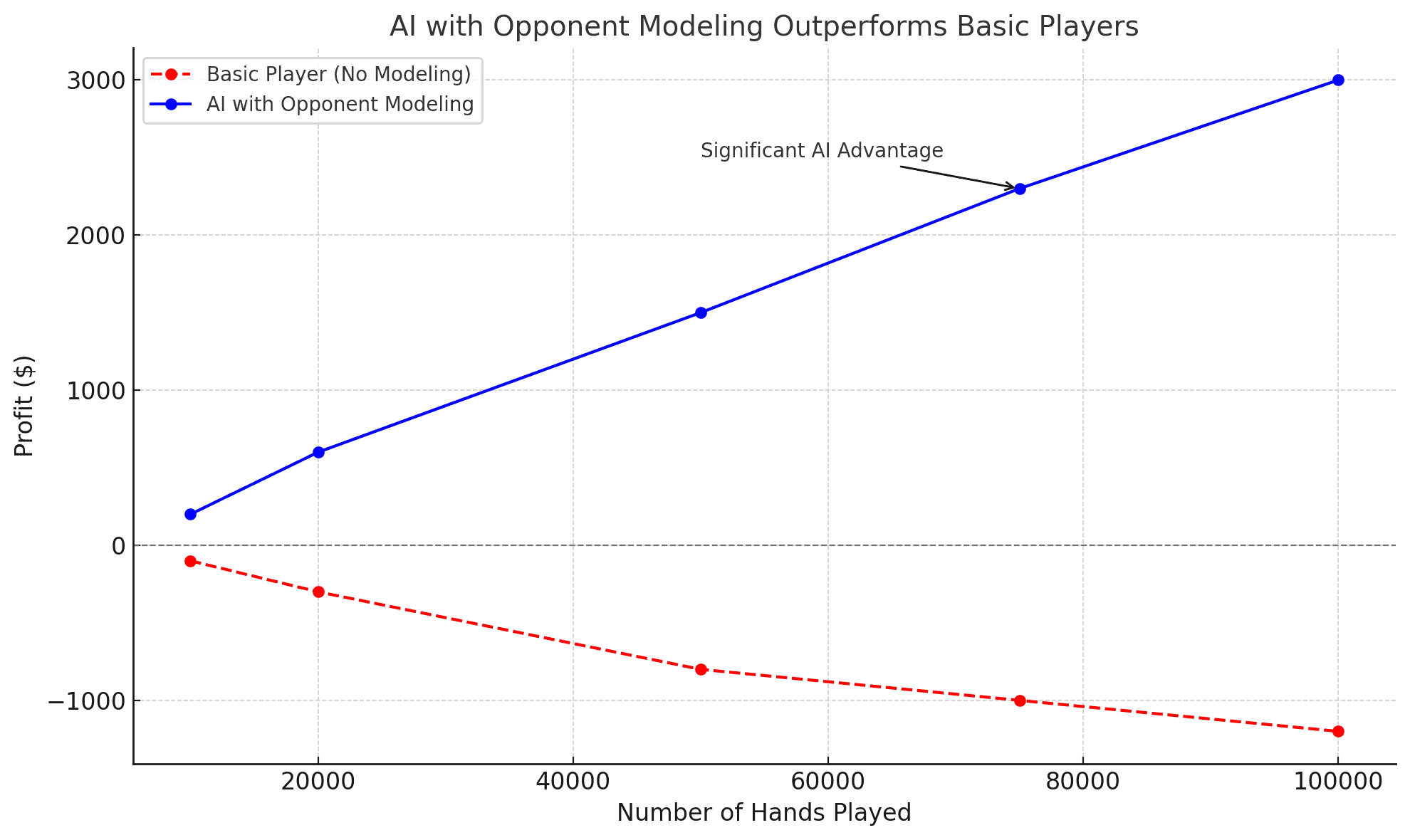
Poker is a game of incomplete information. In chess or checkers, you know what he or she has, but in poker, you don’t. The greats are the ones who can fill in with betting patterns, table dynamics, and psychological insight.
Put together with the cold precision of artificial intelligence, it is human intuition you have. That’s where poker bots and advanced opponent modeling step in – the completely changed ways we think about poker and go into it.
Why Opponent Modeling Matters

Brute – force calculation and game – tree search are ways to mastery in chess, but only because everything is on the chessboard in sight. Poker, by contrast, is all about bluffing, deception, and suboptimal human decisions. It is an intriguing test bed for poker bots but demands quite another approach.
Opponent modeling uses statistical data in order to make predictions regarding the opponent’s most probable range of hands and adjusts strategy accordingly. Rather than making every adversary a faceless player, the technique personalizes the game. Historical betting behavior is put into perspective with the current board conditions and weighted probabilistic outcomes, so as to fine – tune decisions in real – time.
The benefits? To human players, it’s like having a cheat pamphlet of poker hacks; to AI, it’s the difference between a generic strategy and ruthlessly exploiting other people’s mistakes.
The Mechanics of Opponent Modeling
To make this bit more concrete, let’s focus on how opponent modeling works in Texas Hold’em, the most popular form of poker illuminated by world championships like WSOP.
These large – scale simulations are important for decisions tuning in other systems, such as in Pluribus poker and DeepMind poker bot. First, the AI observes the pattern of betting, correlating this to probable hand strength. For instance, the usage of an aggressive raise preflop by an opponent, then being passive upon the flop, may indicate that he actually had a really strong opening hand but failed to connect with the community cards.
It is a process built on the idea of two things: hand strength and hand potential.
- Hand strength estimates the chance that your hand is currently the best. For instance, using an Ace – Queen offsuit on the flop with a Jack – Ten – Eight board, your apparent hand strength could be in bad shape. However, computations could show that your hand will beat a random opponent’s cards about 58.5% of the time.
- Hand potential accounts for how your hand could improve or deteriorate as additional cards are revealed. In the same scenario, drawing a King could complete a straight, significantly boosting your odds.

These metrics, in addition to opponent tendencies, are integrated using AI to determine the best action – saybe a bet, a call, a raise, or a fold. Systems like DeepStack AI and PokerAlfie go even further, dynamically responding to the strategy of opponents over time.
Real – World Applications: Data and Dollars
Indeed, in one experiment, using a poker bot called Loki, opponent modeling proved so effective that, after 100,000 hands, the opponent – modelling version was up over $5,000 on its non – modelling counterpart in a simulated $2/$4 game, and ever – rising bankrolls are normal in online games where players often oppose poker online bots.
Let’s contextualize it in real terms for players.
- Data driven decision making: Well, it allows you to create an opponent model with ease using either poker cheat sheets or some kind of tracking software. Record how often a certain player is folding to three – bets or raising on the river. The patterns develop rather quickly and can be exploited for real money.
- Variance Management: Poker is one of those games full of ups and downs. Frame up your strategy against specific kinks of opponents to minimize your reliance on luck and to make sure you maximize the skill – based edges.

Some of these tools – for instance, the so called purchase bots offer shortcuts toward the exploitation of emerging trends. Of course, not all “hacks” are created equal, and the best approach in general is a balance of human intuition and systematic analysis.
The Role of AI and Bots in Poker
Online poker AI tools raise debates about fairness and skills. That promising an edge to the players is the increased ethical and legal concern brought about by online poker bots. Playing with systems like DeepMind poker bot or PokerAlfie in unregulated environments gives an unfair deal for players using them, while on platforms, AI detectors are increasingly introduced to root out such practices.
Poker, for artificial intelligence researchers, is something of a unique playground in which to consider decision – making under conditions of uncertainty. Already with projects like Pluribus poker AI, it was documented that AI would win against professional players, even in multiplayer, but nothing in technology is perfect: poker machine hacks may eventually take advantage of the predictability of AI, and smart players use adaptive strategies to throw it off.
Becoming a Smarter Player
And how would the poker lover apply these lessons without downloading some sort of poker bot off the internet? Observe, then categorize your opponents: Are they aggressive or passive? Do they bluff often, or only bet when the hand is strong? Build a sort of model in your mind and adjust your game.
For example, if you notice that one player is in love with betting on any kind of flop, it may well be the sign of a poker cheating method of intimidating his opponent. Adjust this by calling his bluff more often or raise on great hands. Against online poker bots, just look for predictable betting patterns they may have. Typically, AI can’t play unorthodox strategies well, so mix it up to keep them off kilter.
Final Thoughts
Poker is a game of incomplete information, but it doesn’t have to be a guessing game. Leverage the insights powered by AI, say DeepStack AI, or sharpen up your strategic intuition – the bottom line remains the same: stack the odds in your favor.
While poker versus bot instances really illustrate something impressive in AI, they also bring out an achievable momentousness of human adaptability. Some tools, like poker now hacks or poker cheat sheets, may give a temporary advantage, but true mastery lies in understanding the deeper aspects of the game.
Ultimately, the biggest challenge of poker – and its ultimate reward – is to reward those that think one step further. You can overcome anything – from a table full of humans to the most advanced poker online AI – with the right tool and frame of mind.
